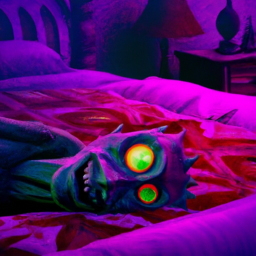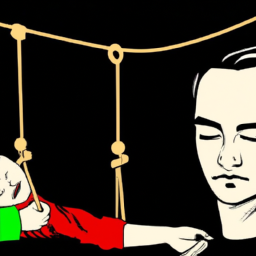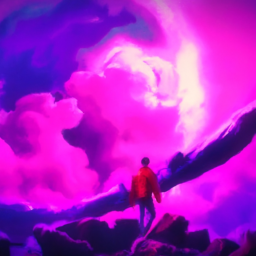As a researcher in the field of psychology, I have always been fascinated by the complex nature and inner workings of monsters. The intriguing question of whether monsters can experience dreams has continually sparked my interest.
Dreams are often seen as a window into our subconscious mind, revealing our deepest desires, fears, and anxieties. But what about monsters? Do they experience dreams like humans do? And if so, what might these dreams entail?
In this article, we will delve into the nature of both monsters and dreams to explore whether or not these two concepts intersect. We will examine the content of monster dreams and how they differ from human dreams, as well as look at examples from mythology to better understand the significance of monster dream research.
Ultimately, we hope to shed light on this intriguing topic and provide insight into the complex world of monsters and their inner lives.
Key Takeaways
- Monsters have emotions and their behavior is shaped by deep-seated emotions and past experiences.
- Monster dreams reveal their psychological makeup and differ in symbolism and imagery from human dreams.
- Cultural beliefs influence monster dreams, and they feature primal instincts and emotions.
- Understanding the connection between monsters and dreams provides insights into their psychology, including their emotions, motivations, and past experiences.
The Complexity of Monsters
You’ll find that monsters are a complex bunch, with intricate emotions and motivations that go far beyond what meets the eye. I’ve come to understand monster psychology and behavior patterns quite well.
Their emotional range is vast, from anger to sadness to joy and everything in between. Monsters are not just simple creatures that exist only to scare humans. They have their own goals and desires, which often drive their behavior towards others.
Their actions may seem random or senseless at times, but upon closer examination, you can see patterns emerging in their behavior. These patterns can be traced back to deep-seated emotions or past experiences that shape their psyche.
It’s fascinating to observe how these emotions manifest themselves in different ways depending on the monster’s nature and upbringing. However, one question remains: When do monsters have dreams?
The answer lies in exploring the nature of dreams themselves.
The Nature of Dreams
Immerse yourself in the mysterious realm of dreams and explore their enigmatic nature. Dreams have fascinated humans for centuries, and science has been studying them for decades to understand their purpose and function. We spend approximately one-third of our lives sleeping, which means we spend a considerable amount of time dreaming. The science behind dreams is complex, but studies suggest that it plays an essential role in consolidating memories, processing emotions, and regulating mood.
Lucid dreaming techniques have gained popularity in recent years as a way to control one’s dreams consciously. Lucid dreaming occurs when the dreamer becomes aware that they are dreaming, allowing them to manipulate the dream’s content intentionally. Techniques such as reality checks, keeping a dream journal, and meditating before bed can increase the likelihood of achieving lucid dreams. While lucid dreaming remains an exciting field of study for scientists and enthusiasts alike, more research is needed to understand its potential benefits fully. Understanding the nature of dreams is crucial in unlocking the mysteries of our subconscious mind.
The Subconscious Mind
Surrender to the secrets of the subconscious mind and explore its mysterious workings through introspection. The subconscious mind is like a vast ocean, full of hidden treasures waiting to be discovered. By delving into the depths of our own minds, we can uncover hidden desires, unresolved conflicts, and repressed emotions that shape our actions and thoughts.
To evoke an emotional response in the audience, consider these three factors:
- The power of visualization: Visualizing positive outcomes can help us achieve our goals.
- The impact of childhood experiences: Our early experiences often shape our beliefs and behaviors.
- The influence of past relationships: Past relationships can affect how we view ourselves and others.
Through subconscious exploration, we can gain a deeper understanding of ourselves and our dreams. Dream interpretation is one way to access the realm of the subconscious mind. As we enter dreamland, our minds are free to wander beyond conscious thought.
In the subsequent section about ‘the content of monster dreams’, we will explore what lurks within this realm and what it reveals about monsters’ inner worlds.
The Content of Monster Dreams
Explore the eerie and fascinating realm of monster dreams, where the subconscious mind unleashes hidden desires, fears, and conflicts. The symbolism of dreams plays a significant role in understanding the content of monster dreams.
For instance, monsters’ nocturnal visions can reveal their psychological makeup, including their deepest fears and desires. Monsters dream like humans do, but their dreams often differ in terms of symbolism and imagery.
As creatures that embody primal instincts and emotions such as fear, aggression, and lust, monsters’ dreamscapes are likely to feature these themes prominently. Understanding how monsters process information subconsciously through their dreams can provide valuable insights into their behavior and motivations.
In the subsequent section about ‘differences from human dreams,’ we’ll delve deeper into how these differences manifest in monster dreaming experiences.
Differences from Human Dreams
You may find that monster dreams are like a twisted funhouse mirror of your own, reflecting back familiar symbols and emotions but distorting them into something primal and terrifying, like a carnival clown turned monstrous. I can tell you that the science behind it is fascinating.
When we dream, our brains process and consolidate memories from the day; however, monsters have different memories and experiences than humans, leading to vastly different dream content. Monsters also have different cultural implications surrounding their existence compared to humans.
For example, in some cultures, monsters are seen as protectors or guides rather than purely evil entities. These cultural beliefs can influence the way monsters appear in dreams and how they interact with the dreamer. The differences between human and monster dreams provide insight into how our respective experiences shape our subconscious minds.
With this understanding comes a greater appreciation for the complexity of both human and monster psychology. This leads us to explore further the connection between monsters and dreams without skipping a beat.
The Connection Between Monsters and Dreams
As I delve deeper into the connection between monsters and dreams, two key points stand out. The importance of sleep and the influence of emotions. Sleep is essential as it allows our brains to process information and restore energy levels. Similarly, monsters also require adequate rest to maintain their physical and mental health.
Moreover, emotions play a crucial role in shaping dreams, and this holds true for monsters as well. Understanding these factors can provide valuable insights into how monster dreams operate and what they may signify.
The Importance of Sleep
Getting enough sleep is crucial for our well-being and happiness, as it allows us to recharge and function at our best. The benefits of a good night’s sleep are numerous, ranging from improved memory and cognitive function to physical health benefits such as lowered risk for heart disease and obesity. On the other hand, sleep deprivation can have serious consequences on both our mental and physical health.
The table below outlines some of the potential consequences of not getting enough sleep:
| Consequence | Description |
|---|---|
| Decreased cognitive function | Difficulty concentrating, decreased problem-solving abilities |
| Mood disturbances | Increased irritability, anxiety, depression |
| Physical health problems | Increased risk for heart disease, obesity, diabetes |
| Impaired immune system | Higher susceptibility to illness |
As we can see from this table, the importance of getting adequate sleep cannot be overstated. With so many potential negative consequences of sleep deprivation, it is crucial that we prioritize getting enough rest each night in order to lead healthy and happy lives. Moving forward into the next section about ‘the influence of emotions’, we will explore how emotions can affect our ability to get a good night’s rest.
The Influence of Emotions
When your mind’s racing with worries and fears, it can be like trying to sleep in a thunderstorm. Emotions play a significant role in our daily lives and influence our ability to sleep soundly. Those who experience trauma or intense emotional distress may find it difficult to fall asleep or stay asleep at night. The impact of trauma on the brain can cause hyperarousal, leading to increased anxiety and fear that interfere with the natural process of falling asleep.
On the other hand, imagination can also affect our dreams and overall quality of sleep. Engaging in creative thinking or daydreaming during the day can lead to more vivid dreams at night, which can be both positive and negative. Some people may have pleasant dreams while others may have nightmares.
In mythology, monsters often represent the darker side of human emotions, such as fear, anger, and jealousy. These emotions are reflected in their dreams and ultimately shape their actions. Examples from mythology provide insight into how monsters’ dreams influenced their behavior in various cultures worldwide.
Examples from Mythology
You’ll be fascinated to learn that in mythology, monsters such as Medusa and the Minotaur were said to have dreams just like humans do. These mythological creatures were not just mindless beasts, but they possessed a complex inner world that extended beyond their physical form. Dreams are an essential part of human life, and it’s intriguing to think that even monsters shared this experience.
Dream symbolism played an important role in the lives of these mythological monsters. For example, dreams could reveal hidden desires or serve as warnings of impending danger. In some cases, dreams were also used as a way to communicate with divine beings or understand one’s place in the universe. Overall, monster dreams had significant meaning and purpose within their respective cultures and societies.
Moving on from the significance of monster dreams, we can further explore how emotions impact their dream experiences.
The Significance of Monster Dreams
It’s fascinating to learn that even mythological creatures like Medusa and the Minotaur possess a complex inner world that extends beyond their physical form, with dream symbolism playing an important role in their lives.
The psychology of monster dreams is an area of study that seeks to understand the significance and cultural interpretations of these dreams.
For example, some cultures believe that certain monsters appearing in dreams can serve as omens for good luck or impending danger.
Others view monster dreams as therapeutic, using them as a way to confront and overcome personal fears.
As researchers continue to explore the symbolism of monster dreams, there is potential for these dreams to be used in therapeutic settings for individuals struggling with anxiety or trauma.
Understanding the importance of these dream experiences can provide insights into the psyche of not only mythological creatures but also ourselves.
As we delve deeper into this field, it’ll be interesting to see how our understanding of monster dreams evolves and how they may be used in therapeutic contexts.
The Future of Monster Dream Research
Get ready to explore the exciting future of researching monster dreams and discover how this field can potentially revolutionize therapy for individuals struggling with anxiety or trauma.
As the study of monster dreams gains momentum, there are several ethical considerations that researchers must keep in mind. Firstly, it’s crucial to ensure that participants fully understand the nature of the study and give informed consent. Secondly, researchers must take steps to protect participants from potential harm caused by discussing their fears and anxieties. Finally, confidentiality must be maintained throughout the research process.
Despite these challenges, there are many funding opportunities available for those interested in pursuing research on monster dreams. Governments and private organizations alike recognize the potential benefits of this field and are more than willing to invest in its development.
With increased funding, researchers will have access to better equipment and resources which will enable them to conduct more comprehensive studies on monster dreams. Ultimately, as we learn more about monsters’ dream patterns and what they signify about human psychology, we’ll be better equipped to help individuals struggling with anxiety or trauma overcome their fears.
Frequently Asked Questions
How do monsters sleep?
Mythical creatures have unique sleeping habits with varying dream cycles. Analyzing the behavior of supernatural beings during slumber can provide insight into their physiology and psychology. Understanding these patterns can aid in serving their needs effectively.
Can monsters have nightmares?
Monsters, like humans, can experience nightmares. Exploring monster psychology and understanding their emotions reveals that these creatures have complex thoughts and feelings, including fear and anxiety, which can manifest in their dreams.
Do monster dreams have any impact on their behavior?
The impact of monster dreams on behavior is significant as they are closely linked with emotions. In fact, studies have shown that the content and intensity of these dreams can affect how monsters interact with others in their environment.
Are there any cultural differences in the way monsters dream?
As a researcher of monster dream symbolism, I’ve found that cultural variations in monster dreams exist. Some cultures view monsters as protectors while others see them as harbingers of doom. Our beliefs shape our dreams, even for monsters.
Is there a way to interpret and analyze monster dreams?
Interpreting nightmares in monsters can reveal psychological implications of their fears and desires. Analyzing the content, symbolism, and emotions in their dreams can provide insight into their psyche and motivations.
Conclusion
In conclusion, exploring the dreams of monsters offers a fascinating glimpse into their complex nature. As we’ve seen, the subconscious mind plays a crucial role in shaping these dreams and revealing deeper aspects of their psyche.
While there are similarities between human and monster dreams, there are also significant differences that highlight the unique qualities of these creatures. As researchers continue to delve deeper into the world of monster dream research, we can expect to uncover even more insights into their inner workings.
Through this exploration, we may gain a greater understanding of not only individual monsters but also broader themes related to fear, power dynamics, and our relationship with the unknown. In sum, monster dream research is an exciting field that promises to shed new light on some of our most enduring cultural myths and legends.
Metaphor: Monster dreams are like dark reflections in a murky pool – they reveal glimpses of something hidden beneath the surface that is both terrifying and intriguing.









